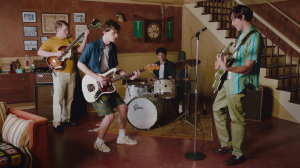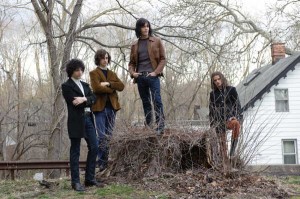NOT FADE AWAY: 2 STARS
 There’s an old saying that goes, “If you can remember the 1960s… you weren’t really there.” That may be true. Ask Grace Slick about 1968 and you’re likely to be met with a blank stare. Luckily for us “Not Fade Away,” the feature debut from “The Sopranos” creator David Chase, is a spot on time capsule of the era. Too bad Chase didn’t write a story to go along with it.
There’s an old saying that goes, “If you can remember the 1960s… you weren’t really there.” That may be true. Ask Grace Slick about 1968 and you’re likely to be met with a blank stare. Luckily for us “Not Fade Away,” the feature debut from “The Sopranos” creator David Chase, is a spot on time capsule of the era. Too bad Chase didn’t write a story to go along with it.
The core of the story revolves around rock ‘n’ blues music, Doug (John Magaro) and the repercussions of living in a turbulent decade. Doug is invisible in high school—particularly to his crush Grace (Bella Heathcoat)—until he discovers a fundamental truth, girls like guys in bands. Playing drums in a Stones-influenced band gives him a taste of the life, but when he switches to lead sing he finds his vocation, much to his father’s (James Gandolfini) dismay. As the Summer of Love approaches so does interest from a recording industry big shot just as Doug contemplates a move to the West Coast to pursue his dream of solo success.
“Not Fade Away” is at least partly autobiographical. Chase was a New Jersey drummer with a Stones fixation, which explains the level of care placed on the details, but it is hard to whip up excitement for a movie that tips its hand in the opening narration.
We’re told off the bat that this is the story of a band that never made it. It’s an anticlimactic way to start a film, and doesn’t get any grabbier from there. It is interesting to watch Chase establish the time and place. The film is a cornucopia of 60s pop culture. The song “Satisfaction” blends effortlessly with the old-school Emergency Broadcast System alarm off the top, heralding a greatest hits of 60s cultural icons like “The twilight Zone,” Archie comics, JFK’s assassination, even a sneering Dean Martin rolling his eyes after a Stones’s performance on “The Hollywood Palace,” with the words “They’re leaving right after the show for London—they’re challenging the Beatles to a hair-pulling contest.”
All that nicely sets up the decade and the anti-establishment stance personified by the soundtrack’s music, but is let down by episodic storytelling and the lack of really compelling characters or situations. From the opening moments the story builds to an anti-climax, and on that score it delivers, providing one of the oddest and least satisfying conclusions to a movie in recent memory.
As an exercise in nostalgia “Not fade Away” mostly works, but like many trips down memory lane, the people you meet aren’t always as interesting as you remember them.

